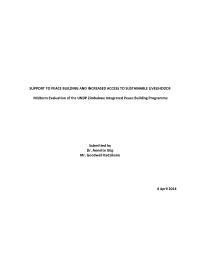
Mid-Term Evaluation of the Support to Peace Building and Increased Access to Sustainable Livelihoods (PBSL) Programme in Zimbabwe: 2012 - 2014
Completedon 21 Apr, 2014
Evaluation Plan
Planned End Date
Dec 2013
Evaluation Type
Project
Management Response
Yes
Evaluation Budget
$33,182
Evaluation Title
Mid-Term Evaluation of the Support to Peace Building and Increased Access to Sustainable Livelihoods (PBSL) Programme in Zimbabwe: 2012 - 2014
Atlas Project Number
00079951
Plan Period
Status
Completed
Type
Project
Plan Date
1 Dec, 2013
Completion Date
21 Apr, 2014
Budget
$33,182
Expenditure
$0
Source of Funding
UNDP
Management Response
Yes
Quality Assessment
No
Joint Programme
No
Joint Evaluation
No
GEF Evaluation
No
Stakeholders
GoZ, UNDP
Countries
Zimbabwe
Atlas Project Number
00079951
Plan Period
Status
Completed
Type
Project
Management Response
Yes
Plan Date
1 Dec, 2013
Quality Assessment
No
Completion Date
21 Apr, 2014
Joint Programme
No
Joint Evaluation
No
Budget
$33,182
GEF Evaluation
No
Expenditure
$0
Stakeholders
GoZ, UNDP
Source of Funding
UNDP
Countries
Zimbabwe
Output 1.1. National and sub-national systems and institutions enabled to achieve structural transformation of productive capacities that are sustainable and employment - and livelihoods- intensive
1: Others


